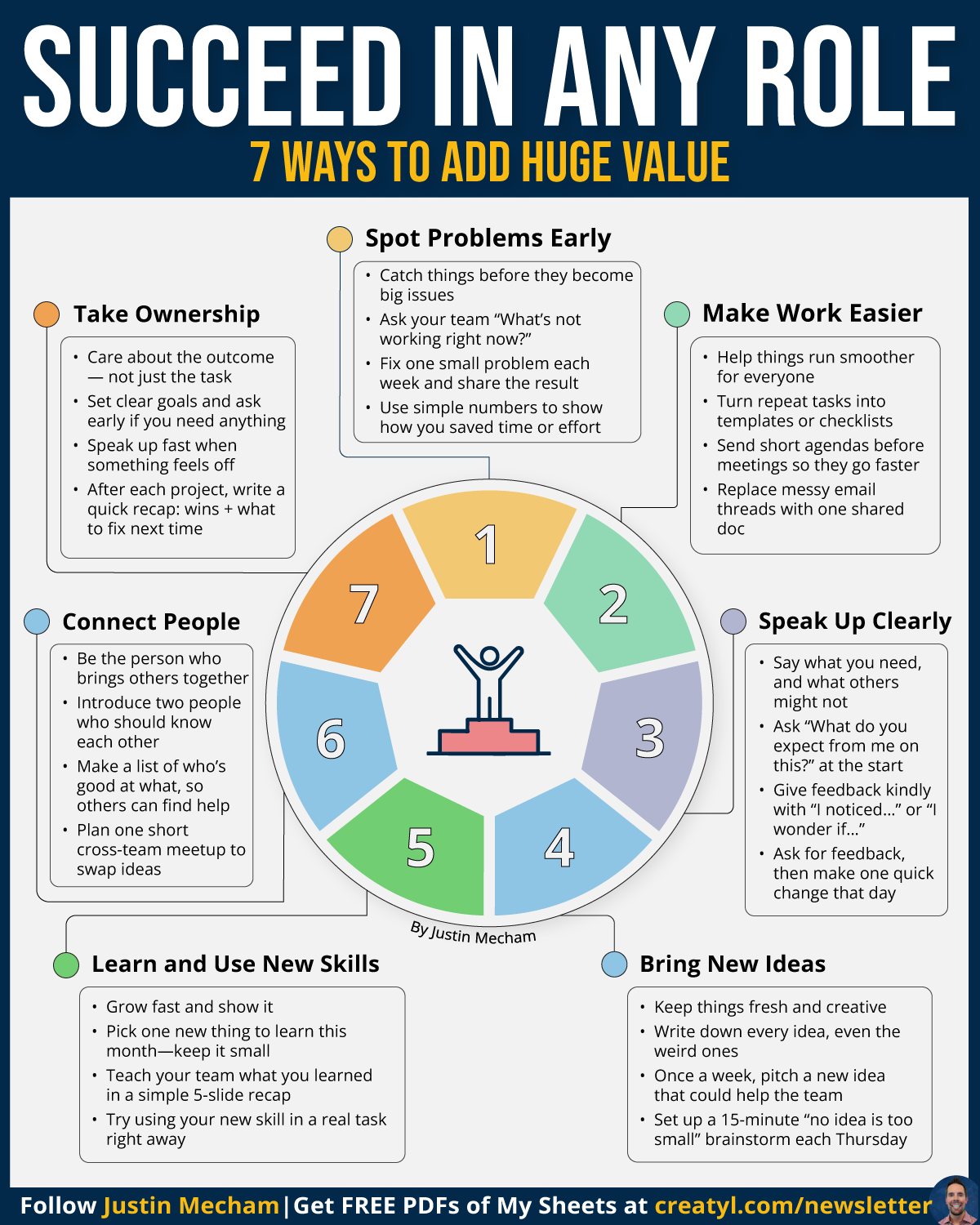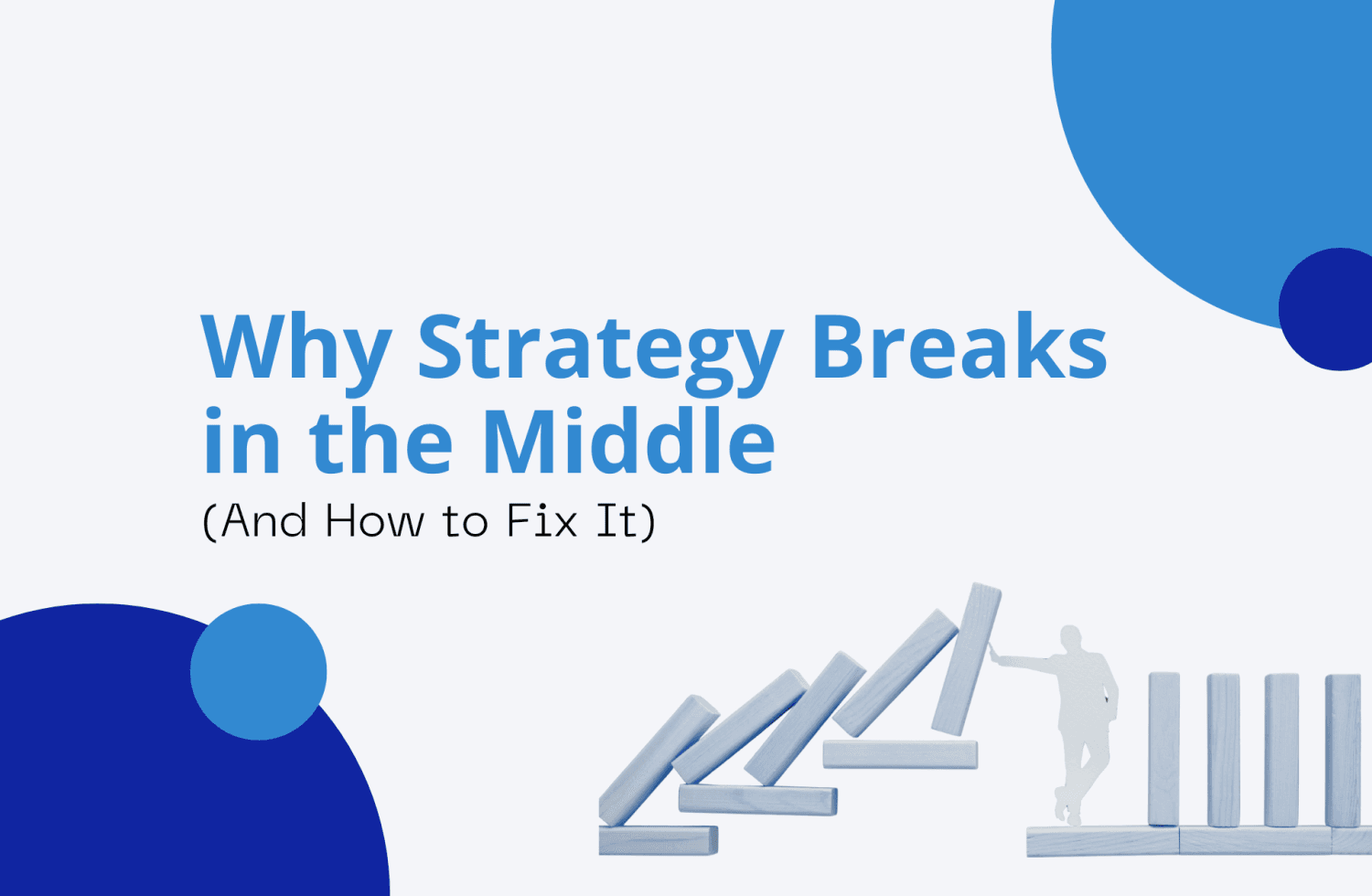Click Here to Download the PDF
Most people are waiting for the next big thing.
The next opportunity.
The next project.
The next promotion.
The next signal that they’re finally seen, valued, and respected.
But here’s what most folks never tell you:
The people who stand out the most didn’t wait for the title.
They made themselves valuable without one.
They started acting like the person others wanted on their team—before they were officially asked.
They fixed things no one else noticed.
They made life easier, not harder.
They had ideas, spoke up, made space, and showed they cared about the outcome—not just the task.
And over time, that kind of person becomes the go-to.
Not because they shout the loudest or hustle the longest—but because they’re actually making the work (and the team) better.
Here’s how to do that—no matter what your role is right now.
Seven simple habits that will make you invaluable, respected, and remembered.
Let’s break them down.
1. Spot Problems Before They Spill Over
Every team has friction points.
A messy handoff.
A missed detail that keeps coming back.
A five-step task that should be two.
A “that’s just how we do it” that wastes hours.
The problem is, most people notice these things and keep going.
They assume it’s not their place.
Or they’re too busy.
Or they don’t think fixing it will matter much.
But the truth is, value starts with noticing—and doing something small about it.
That could mean:
- Asking your team, “What’s not working right now?”
- Documenting a task no one has written down
- Fixing a small system hiccup and sharing the before/after
- Catching a broken process early and flagging it with a simple solution
You don’t have to solve every problem. Just pick one a week.
Track what you fixed.
Track how long it saves.
Then quietly tell someone: “I changed this—it’s working better now.”
Do that consistently, and people start to notice.
Because now, you’re not just someone who gets the job done.
You’re someone who makes the job better for everyone.
2. Make Work Easier for Other People (Not Just Yourself)
There’s a difference between doing your job—and making everyone else’s smoother.
You’ve probably worked with someone who left behind a mess.
They finish their task, but it creates five more problems for someone else.
Now compare that to the person who builds a shortcut, shares a template, simplifies a meeting, or creates one shared doc to cut through all the noise.
Which one do you want on your team?
Here’s what making work easier can actually look like:
- Turning a repeat task into a checklist so no one has to reinvent it
- Swapping five email approvals for one shared Google Doc
- Creating a “project start kit” so launches don’t feel chaotic
- Writing a better subject line or thread name so everyone finds things faster
- Offering a quick explainer before meetings to avoid confusion
And here’s the best part: you don’t need anyone’s permission to do this.
You just need to care enough to simplify what’s hard.
Not for recognition.
Just because it’s the kind of teammate you want to be.
3. Speak Up When It’s Easier to Stay Quiet
It’s easy to keep your head down.
Especially when things feel unclear, tense, or uncertain.
But here’s the hard truth: when you stay silent, you trade clarity for comfort.
High-value people speak up—not to criticize, but to create direction.
They don’t let projects drift or tensions simmer.
They ask the uncomfortable question, give thoughtful feedback, and say what they need—before it becomes a problem.
That might sound like:
- “What do you expect from me on this project?”
- “Here’s what I need to deliver this on time.”
- “I noticed we’re running into the same issue again—can we talk about that?”
- “I wonder if it would help to try a different approach…”
You don’t have to be blunt.
You don’t have to be perfect.
You just have to be clear.
And when you are, people stop guessing.
They start trusting you to be direct, fair, and honest.
That trust becomes one of your most valuable assets.
4. Share Ideas Before They Feel Fully Ready
You don’t need to be an innovation genius to bring new ideas.
You just need to stop holding back the small ones.
So many of the best ideas in the workplace don’t come from a brainstorm session.
They come from someone saying, “Hey, what if we tried this?”
Ideas don’t need to be fully formed.
They don’t need a 20-slide deck.
They just need a moment of air—and someone brave enough to offer them.
Try starting an “idea bank” doc.
Jot down anything you notice that could make things faster, simpler, or better.
Then, once a week, pick one idea to pitch.
Doesn’t have to be big. Just has to be useful.
I once helped a team that started a 15-minute “tiny idea” meeting on Thursdays.
No pressure. No big agenda.
Just space to ask: “What’s something small we could test?”
One designer suggested saving three standard layouts into Figma templates.
That single change cut design time by 40%.
It became the new norm across five departments.
All because someone shared something small.
5. Pick Up a New Skill—Then Pay It Forward
You’ve probably been told you need to keep learning.
But here’s the part most people skip: learning isn’t just about you.
It’s about how you apply what you learned—and how you pass it on.
It’s one thing to read a book or take a course.
It’s another to say, “Here’s what I learned, and how we can use it right now.”
Make learning visible.
Pick one micro-skill this month—nothing fancy.
Maybe it’s using AI to summarize meeting notes.
Maybe it’s creating better slide decks.
Maybe it’s writing faster emails or using automation tools.
Then, teach it back.
Build a 5-slide walk-through.
Record a 3-minute screen share.
Host a short team huddle and show them the shortcut.
It doesn’t just help your team.
It shows initiative, clarity, and the kind of leadership people respect—because you’re making knowledge useful.
You’re not hoarding it.
You’re sharing it.
And that builds trust fast.
6. Be the Person Who Connects People
One of the most underrated ways to add value?
Help the right people meet each other.
You don’t need a manager title.
You just need to care about how people work together—and help them work better.
That might look like:
- Introducing someone from sales to someone from support who are tackling the same issue from different ends
- Sharing “who’s good at what” during onboarding so new hires find the right people faster
- Planning a casual cross-team idea session once a quarter to share insights
On one team, I created a public “skills map.”
Each person listed what they were good at, what they liked doing, and what they were willing to help with.
It changed everything.
Suddenly, people weren’t guessing who to ask for help.
They were connecting faster.
And getting stuck less.
People remember the ones who help them find what they didn’t even know they needed.
Be that person.
7. Care About the Outcome, Not Just Your Task
This is the habit that separates the doers from the leaders—regardless of job title.
Taking ownership doesn’t mean taking on more than your share.
It means caring deeply about how the whole thing turns out.
When things feel off, you say something.
When timelines shift, you clarify instead of staying quiet.
When a project wraps, you reflect on what went well—and what you’d fix next time.
On one project, I worked with a marketing team that always finished their “part,” but the final results were messy.
Everyone pointed fingers.
No one looked at the whole picture.
We shifted the conversation.
At the end of each campaign, each person wrote a short recap:
- What worked
- What felt off
- What we’d change next time
It took 10 minutes.
But it changed how people showed up.
Suddenly, they weren’t just checking boxes.
They were taking pride in the full result.
And that kind of mindset?
It gets noticed—and respected—more than any job title ever could.
Real Workplace Example: How These 7 Habits Saved a Team in Crisis
A fast-paced marketing team was falling apart.
Campaigns were late.
Deadlines were missed.
Clients were frustrated.
And inside the team? Everyone was burned out, frustrated, and silently blaming each other.
No one owned the full picture.
They were busy—but not effective.
And after losing one of their biggest clients, they knew something had to change.
When I joined as a consultant, it was clear: they didn’t need more people.
They needed better systems, better clarity, and better habits.
People were working hard—but without direction.
Everyone felt overwhelmed.
Meetings ran long.
Expectations weren’t clear.
And most of the team was too afraid to speak up.
We didn’t blow everything up.
We didn’t hire a new layer of managers.
We simply applied the 7 value habits—one by one.
We started with a weekly “What’s not working?” check-in.
Every week, the team identified one friction point and fixed it—together.
We created shared docs, turned email chains into templates, ran a monthly skill-share, and set up a Thursday “tiny ideas” huddle.
People began sharing fixes.
Speaking up with clarity.
Owning their work—and the outcome.
60 days later, they weren’t just meeting deadlines.
They were ahead of them.
Client retention went up.
The team was calmer, clearer, and more confident.
All because they stopped waiting for things to change—and started adding value from wherever they stood.
Top Resources to Help You Add Value Today
You don’t need to figure this out alone.
Here are some of the most popular, useful tools out there for applying this mindset:
Book:
Multipliers: How the Best Leaders Make Everyone Smarter
By Liz Wiseman & Greg McKeown
→ How to stop being the smartest person in the room—and start helping others shine. A must-read for anyone serious about showing up differently at work.
TED Talk:
How to Claim Your Leadership Power
By Michael Timms
→ A fresh, honest take on what real leadership looks like when you don’t have the title yet.
AI Tool:
ChatGPT by OpenAI
→ Use it to brainstorm ideas, write clearer team recaps, simplify processes, or summarize learnings fast.
Podcast:
Dare to Lead by Brené Brown
→ Insightful episodes that explore real leadership, tough conversations, and the kind of courage it takes to lead well.
You Already Have What It Takes to Be the Person Every Team Wants
Titles will come and go. But the value you create stays with you.
You don’t have to wait for someone to give you permission to start showing up differently.
You can start today.
You can speak with clarity.
You can fix one small thing.
You can pitch one useful idea.
You can help one person.
You can make one task easier.
You can learn something new and share it.
You can care deeply about how the whole thing turns out.
Success in any role doesn’t belong to the loudest person.
It belongs to the one who chooses to show up with care, clarity, and consistency.
No matter what your title is right now—you can be that person.
And when you are, people notice.
They remember.
They rely on you.
They bring you into the rooms that matter.
Not because you asked.
But because you already showed up like you belonged there.
Want the Infographic as a PDF?
If you want to keep these 7 habits close by, you can download the full “Succeed in Any Role” infographic in a clean, printable PDF format.
It’s perfect to save, share with your team, or use as a guide for your next team meeting.





